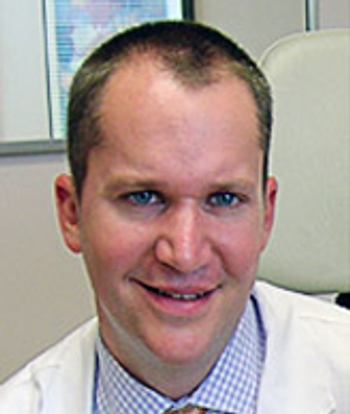
One of the more difficult topics to discuss concerning the ethics of healthcare is distributive justice-the fair distribution of benefits, risks, and costs.

Your AI-Trained Oncology Knowledge Connection!


One of the more difficult topics to discuss concerning the ethics of healthcare is distributive justice-the fair distribution of benefits, risks, and costs.

A delirious head and neck cancer patient does not have the capacity to make treatment decisions. Can we begin palliative radiation therapy without his consent?

Should I give a patient with a carcinoma of unknown primary another dose of a study drug, since she is requesting to continue it? My reading of the trial protocol suggests no absolute restriction on giving another dose of the drug.

I was recently consulted concerning a patient in the ICU at my hospital with advanced breast cancer, but I soon realized there were much larger issues at stake. This woman is in her 50s and was diagnosed approximately 1 year ago with metastatic triple-negative breast cancer.

In a case of a patient with impaired decision-making, is the physician obligated to go through with a transplant when the transplant-related mortality would be on the order of 50%, and possibly as high as 80%?

There are risks to privacy and informed consent embedded in the many exciting discoveries of personalized approaches to medicine. These risks vary greatly.

A 40-year-old woman with no significant family history of cancer came to me for a second opinion about her widely metastatic infiltrating gastric cancer.

I looked after one of my partner’s patients who is approaching death from advanced, refractory ovarian cancer. She asked me not to talk about anything negative with her. We can’t really make any decisions without discussing negative things. Should I just remain silent about them at her request?

One way of framing the ethical question in this case might be: “What are my ethical obligations to provide an anticancer therapy when I think it is unlikely to benefit the patient?” The broader clinical questions involved in this case are fundamentally the same in most patients.

In this article, we have chosen to focus on three ethical challenges that we believe practicing oncologists might commonly encounter with their patients. The ethical dilemmas are presented in a case-based approach in the hope of better joining the ethical theory to clinical practice.

My suggestion, as unrealistic as it is, would be to encourage the creation and maintenance of parallel groups of quality measures: one set to satisfy the reportable measures of quality that affect reimbursements and pay for performance, and a second set that would be developed by and adapted to each institution to measure and drive improvements in those things we felt were true measures of high quality care.

As is nearly always the case with international travel, and especially in a place so different from what we are accustomed to in the United States, the whole experience was delightfully eye-opening, both for those dimensions of medical care and education that struck me as remarkably similar, as well as those that seemed wholly foreign.

The family of a young woman with a brainstem glioma has been haranguing her physician to continue bevacizumab treatment despite a significant decline in her functional status. How to respond?

I have come to the conclusion that a successful systematic approach to earlier transitions from disease-directed cancer therapy to end-of-life and palliative care can only come from better communication in the context of more trusting relationships.

“Personalized medicine” holds its promise only at the substantial cost of widespread use of the awesome tools of molecular science, and at a time of intense scrutiny of the costs and benefits of medical treatments, can we really afford it?

Cross-cultural miscommunication has undermined this immigrant's trust in his physician. How do you respond to his demand that alternative therapies be discussed?

What is the most ethical way to make difficult treatment decisions for a patient with dementia who has no living relatives and no advance directives?

A patient on opiate therapy insists on working against her physician’s recommendations. She works as a nurse. Should the doctor inform her employer?

CancerNetwork speaks with two practicing oncologists about how the recent Supreme Court decision to uphold the Affordable Care Act will affect oncology practices and patients.

How will we deal with patients and families who, given their tremendous access to information, learn about and demand expensive (and up until now reasonable) treatments once we have recast them as too expensive to justify their marginal benefits? Are we prepared to engage in such discussions directly?

In 2002, the American Society of Clinical Oncology (ASCO) established the Cancer Prevention Committee (CAPC), which was formed in the hope of ensuring the integration of cancer prevention into oncology practice and research.[1]

Esophageal cancer frequently expresses cyclooxygenase-2 (COX-2)enzyme. In preclinical studies, COX-2 inhibition results in decreasedcell proliferation and potentiation of chemotherapy and radiation. Wereport preliminary results of a phase II study conducted by the HoosierOncology Group in patients with potentially resectable esophageal cancer.All patients received cisplatin at 75 mg/m2 given on days 1 and 29and fluorouracil (5-FU) at 1,000 mg/m2 on days 1 to 4 and 29 to 32with radiation (50.4 Gy beginning on day 1). Celecoxib (Celebrex) wasadministered at 200 mg orally twice daily beginning on day 1 untilsurgery and then at 400 mg orally twice daily until disease progressionor unexpected toxicities, or for a maximum of 5 years. Esophagectomywas performed 4 to 6 weeks after completion of chemoradiation. Theprimary study end point was pathologic complete response (pCR). Secondaryend points included response rate, toxicity, overall survival, andcorrelation between COX-2 expression and pCR. Thirty-one patientswere enrolled from March 2001 to July 2002. Respective grade 3/4 toxicitieswere experienced by 58%/19% of patients, and consisted of granulocytopenia(16%), nausea/vomiting (16%), esophagitis (10%), dehydration(10%), stomatitis (6%), and diarrhea (3%). Seven patients (24%)required initiation of enteral feedings. There have been seven deathsso far, resulting from postoperative complications (2), pulmonary embolism(1), pneumonia (1), and progressive disease (3). Of the 22 patients(71%) who underwent surgery, 5 had pCR (22%). We concludethat the addition of celecoxib to chemoradiation is well tolerated. ThepCR rate of 22% in this study is similar to that reported with the use ofpreoperative chemoradiation in other trials. Further follow-up is necessaryto assess the impact of maintenance therapy with celecoxib onoverall survival.

The explosion of medical information readily available on the Internet has already changed doctors’ conversations with patients. Ten years ago, patients might have come to a clinic visit with a newspaper or magazine article, but it would have

Published: June 29th 2012 | Updated:

Published: September 6th 2012 | Updated:

Published: December 20th 2012 | Updated:

Published: February 6th 2013 | Updated:

Published: August 21st 2012 | Updated:

Published: May 15th 2012 | Updated: